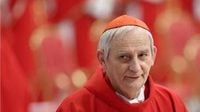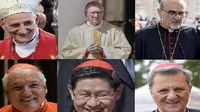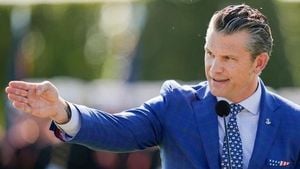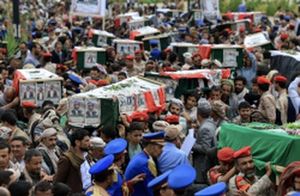As the sun sets on May 7, 2025, the Vatican is abuzz with anticipation as the conclave to elect a new pope officially begins. Among the 133 cardinal electors, one name stands out: Matteo Maria Zuppi, the current Cardinal of Bologna and president of the Italian Episcopal Conference. Zuppi, who has garnered attention for his empathetic approach to the marginalized and his commitment to peace, is considered a strong contender for the papacy.
According to the New York Times, Zuppi has been described as welcoming towards LGBTQ Catholics, mirroring the inclusive spirit of Pope Francis. The 69-year-old cardinal was chosen by Francis to become a cardinal in 2019, and he has since emerged as a prominent figure in the Church, especially among those who feel distanced from its traditional teachings.
His preference for a modest lifestyle, much like that of Pope Francis, further endears him to many. The New York Times highlighted Zuppi's aversion to luxury, noting that he has chosen to live in a simple residence for retired priests in Bologna rather than the opulent Apostolic Palace. This decision reflects his commitment to humility and service, values that resonate deeply within the modern Church.
In addition to his pastoral duties, Zuppi has played a crucial role in international peace efforts. He was a key negotiator in the peace talks that resulted in the 1992 agreement ending the civil war in Mozambique. More recently, in 2023, Pope Francis appointed him as a peace envoy between Ukraine and Russia. Although Zuppi's mission did not lead to an immediate resolution, many Ukrainians regarded his efforts as a significant step towards dialogue.
His background as a 'street priest' in the parish of Santa Maria in Trastevere has solidified his reputation as a compassionate leader. Zuppi has dedicated his ministry to serving the poor, migrants, and the homeless, embodying the Church's mission to reach out to those in need. His empathetic nature and dedication to social justice have attracted support not only from within the Church but also from secular circles.
As the conclave unfolds, the dynamics among the electors will be crucial. With 89 votes needed to elect a pope, alliances are forming, and the stakes are high. Cardinal Pietro Parolin, the Vatican's Secretary of State, is also a front-runner, seen as a unifying figure who could appeal to both conservative and progressive factions within the Church. Parolin is believed to have a substantial base of support, potentially around 50 votes.
Another strong candidate is Pierbattista Pizzaballa, the Patriarch of Jerusalem, who was appointed a cardinal by Pope Francis. His Franciscan background aligns him with the spirit of humility and poverty that Francis has championed.
While Zuppi's progressive stance on various issues may be seen as a double-edged sword, his close association with Pope Francis positions him as a candidate who could continue the current pope's legacy of inclusivity and outreach. However, there are concerns that his progressive views might alienate more conservative electors.
Among the other contenders is Luis Antonio Tagle, the Filipino cardinal known for advocating a reformed Curia that better addresses the needs of the faithful. Tagle's emphasis on social justice and pastoral care aligns with the vision set forth by Pope Francis, making him another candidate to watch.
Mario Grech, the Maltese cardinal, is also in the mix, seen as a potential compromise candidate who might bridge the gap between progressive and conservative factions. His shift towards greater openness on issues such as LGBTQ inclusion could attract diverse support.
Jean-Marc Aveline, the cardinal of Marseille, is another notable figure in the running. Aveline is recognized for his commitment to interfaith dialogue and addressing immigration issues, reflecting the pastoral priorities of Pope Francis.
In the background, Robert Francis Prevost is gaining traction as a candidate closely aligned with Francis's vision. Prevost's focus on inclusivity and social justice resonates with those who seek continuity in the Church's mission.
As the conclave progresses, the potential for a groundbreaking election looms large. The possibility of electing the first African pope, Fridolin Ambongo, Archbishop of Kinshasa, adds another layer of intrigue to the proceedings. Ambongo is a well-respected figure in Africa, known for his moral clarity and commitment to social justice.
With the first vote scheduled for later today, the world watches closely, eager to see who will emerge as the next leader of the Catholic Church. Will the electors choose continuity with a candidate like Zuppi, or will they opt for a more conservative figure like Parolin? The outcome of this conclave could shape the future of the Church for years to come, reflecting the diverse perspectives and hopes of its global congregation.
As the cardinals gather to cast their votes, the spirit of anticipation is palpable. Zuppi's journey from a street priest to a papal contender exemplifies the evolving nature of the Church, one that seeks to embrace all of its faithful while navigating the complexities of modern society.
In the coming days, the world will learn not only the identity of the new pope but also the direction the Church will take in addressing pressing issues such as social justice, inclusivity, and the role of faith in a rapidly changing world. The conclave marks a pivotal moment in the history of the Catholic Church, one that could redefine its mission and impact in the years ahead.





